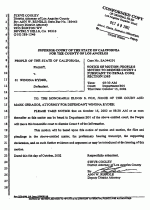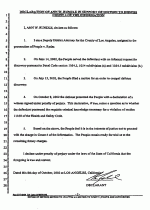Doc Helped Winona Beat Drug Rap
Disgraced Dr. Feelgood helped Ryder bounce drug rap

View Document
On the eve of Winona Ryder's criminal trial, Los Angeles prosecutors agreed to drop a felony drug possession charge when the actress's lawyer presented the D.A.'s office with a confidential declaration from an L.A. doctor who swore that he had provided the painkiller Oxycodone to Ryder without a prescription.
But The Smoking Gun has learned that the legal declaration/alibi relied upon by prosecutors was sworn, amazingly, by none other than Jules Lusman, the disgraced "Dr. Feelgood" whose medical license was revoked last year for gross incompetence and repeated negligent acts. In fact, when Mark Geragos, Ryder's attorney, provided prosecutors with Lusman's declaration on October 8, the Santa Monica doctor had already been suspended from prescribing drugs by the Medical Board of California. The license suspension, issued in March 2002, came three months after investigators executed search warrants at Lusman's office, home, and car. On November 6, 2002 the medical board formally revoked Lusman's license.
Since the 49-year-old Lusman appears to be a rather questionable character witness, it seems strange that L.A. prosecutors would actually put any stock in his claim that he gave Ryder the pair of Oxycodone pills that cops found in the actress's purse at the time of her December 2001 shoplifting arrest. Especially since Lusman was the sole witness proffered by the Ryder defense in its bid to bounce the felony drug count, which carried a maximum of several years in jail upon conviction. When she was arrested, Ryder was carrying eight different drugs, seven of which she had prescriptions for. She was hit with the felony drug charge for illegally possessing tablets of Endocet, a generic form of Oxycodone.
On November 9, a day after Geragos gave prosecutors the Lusman declaration, Deputy D.A. Ann Rundle filed the below motion seeking dismissal of the drug count, which was filed nine months earlier. Rundle wrote to Judge Elden Fox that Ryder's lawyer had given her "a declaration of a witness signed under penalty of perjury" that "if true, raises a question as to whether the defendant possessed the requisite criminal knowledge necessary" to support the felony drug charge. Both sides declined to identify the declaration's author, though each acknowledged it was sworn by a doctor who had treated Ryder. Fox granted the D.A.'s dismissal motion on October 16.
Sandi Gibbons, the D.A.'s spokesperson, declined to provide a copy of the November 8 declaration, which she said was "not a public document." Gibbons told TSG that the information provided in the declaration "was such that, if presented to a jury, would likely result in an acquittal" on the drug charge. She declined to answer questions why the D.A. would rely on the tainted Lusman and suggested that a reporter file a public records request and then "battle it out in court" with the D.A.'s office.
By November 2002, investigators handling the Ryder case were well aware of Lusman's sleazy modus operandi, which the state medical board derided as a "cash-and-carry" practice. In fact, according to Ryder's probation report, within days of the actress's arrest, a board investigator reached out to her L.A. counterparts with details of Ryder's involvement with Lusman, then the subject of a lengthy state probe. The investigator, Charlene McKenzie, reported that Lusman's connection with Ryder was uncovered as a result of search warrants executed on the doctor's home and office. The seized records revealed that Lusman provided a variety of painkillers to Ryder, who received prescriptions in her own name as that of an alias, Emily Thompson. In light of the felony count brought against Ryder charging her with illegal possession of tablets of Oxycodone, the probation report notes that medical board investigators discovered "no prescriptions under any known aka of the defendant...for the schedule II drugs oxycodone and hydrocodone."
Details of Ryder's drug use and Lusman's illicit prescription practices did not surface until December 6, the day Ryder was sentenced and her probation report--which mentioned Lusman by name--was released. Today, the defrocked doctor seems to have soured on the patient for whom he swore out the November declaration. In this week's National Enquirer, Lusman alleges that Ryder--during a January 2002 visit to his office with a lawyer from Geragos's office--swiped a prescription slip (which she then tried to pass months later at a San Francisco druggist). Lusman apparently did not recount that episode in his sworn declaration.





